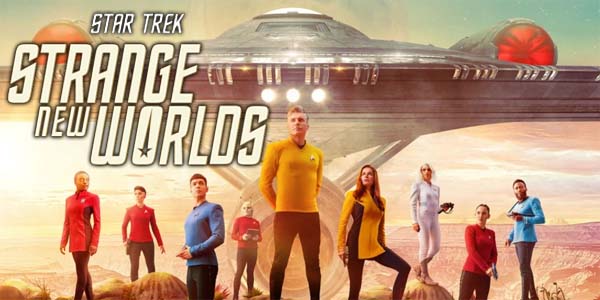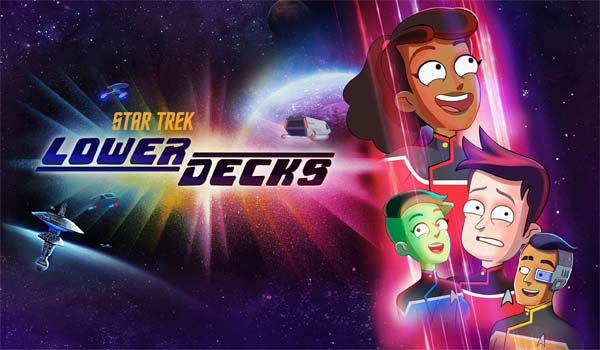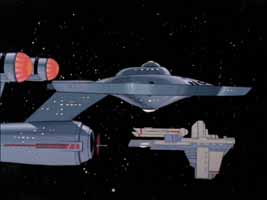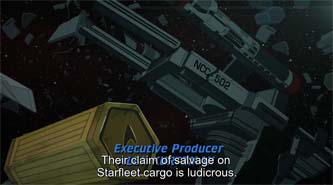
CBS and Paramount are finally learning. After years of trying to force some offensively awful Star Trek down our throats, they've finally given us something palatable. Well, I guess that's not entirely fair. I actually like Lower Decks. But Lower Decks is a self-parody animated comedy, so it's not really "serious" Star Trek, even though it's far more worthy of the franchise than the first season of Discovery or Picard.
Well, now Paramount+ also has a live-action Star Trek show worthy of the name, in the form of Strange New Worlds.
The first episode of Strange New Worlds is much more in-line with what I expect from a Star Trek show. I already talked up the virtues of an episodic format in my Lower Decks review, but focused mostly on how the self-contained nature of episodes allows some to be bad without dragging down the entire season or series with them. But the episodic nature of Lower Decks and Strange New Worlds also highlights another fundamental advantage of the episodic format: those self-contained episodes can tell more high-concept stories.
 © CBS
© CBS
Strange New Worlds is about learning from past mistakes and getting better.
The first episode of Strange New Worlds isn't the most creative or the highest of concept stories, but it's a serviceable story that is true to the spirit of classic Trek, and I'll be spoiling a lot of its plot in the coming paragraph. A first contact goes wrong, and the Enterprise has to be called into rescue the missing crew of a small scout ship. They find a pre-warp civilization that learned to reverse-engineer a warp drive from observing the events of Star Trek: Discovery. Except these people didn't use the technology to build a propulsion device; they're using it to build a weapon that they plan to use to end their own civil war. Realizing that Federation activity has already influenced the cultural development of the planet, Captain Pike decides that General Order One (the non-interference Prime Directive) does not apply. He choses to share the history of Earth's World War III (which this series assumes lies in our real-life immediate future) in an attempt to convince the warring factions to reconcile instead of risk mutual destruction.
Put simply, the first episode of Strange New Worlds differs from Discovery in that it is about preventing a war instead of starting one. It's about learning from the mistakes of past history so that they aren't repeated. And it's a stark warning of what might go wrong in today's society if political tensions don't cool off, without having to depict a future for humanity in which no social progress seems to have happened at all.
It's the type of forward-thinking story that I like about classic Trek, but which is absent from Discovery and especially from Picard (well, the first season anyway). Those shows give us a view of the future in which all the same problems that exist today still exist in 2 or 300 years. Strange New Worlds goes back to depicting a future in which humanity has learned from its past mistakes and improved itself. It's the hopeful, optimistic future that I loved from the older shows. I want to see more modern science fiction depicting futures for its audience to aspire to, instead of all the bleak, dystopian settings that dominate modern sci-fi and makes our future feel hopeless.
[More]
55d95b0e-adc5-437b-b367-2d7d9e457ad6|0|.0
Tags:Star Trek, Star Trek: Strange New Worlds, CBS, Paramount+, USS Enterprise, Christopher Pike, Spock, Nurse Chapel, Uhura, Sam Kirk, science fiction, warp drive, Starfleet, Federation, first contact, Prime Directive, Star Trek: Discovery

It took me a while to get around to watching this one. After having been immensely disappointed and frustrated with both Star Trek: Discovery and Picard, I was not going to give CBS a single penny of my money. I still haven't watched the second season of Discovery (let alone the third), despite having heard that the second season is an improvement. In fact, I've been so bitter at CBS that I didn't even bother activating my account to stream the second season of Twilight Zone, even though the first season was good enough that I was curious to see the second season. I also didn't bother reactivating my CBS account to stream Star Trek: Lower Decks, even though my partner really wanted to watch it.
I was willing to cut a little more slack for Lower Decks, on the grounds that "surely an animated comedy will not be considered 'canon', so I don't have to take Lower Decks as seriously." But then I started seeing events, characters, and ships from Lower Decks showing up in articles on the Memory Alpha Star Trek wiki, and the thought of having to take Lower Decks seriously as canon tanked my interest in watching the show. I wouldn't be able to sit back and enjoy Lower Decks in the manner that I enjoy something like The Orville; I would have to watch it with my critic glasses on, and the baggage of expectations that comes with carrying the Star Trek torch.
I told my partner I didn't want to pay for CBS, so we would wait until all the episodes had aired, do the free trial with a new email address, and binge them all in like a weekend or something. And maybe I'd check out season 2 of Twilight Zone while I was at it. But we didn't keep track of the progress of the show, it fell onto the back-burner, and we just didn't get around to it.
Then, a few weeks ago, a friend offered to let me borrow his downloads of the show, as well as offering pretty high praise. My partner and I still wanted to give Lower Decks a chance, so I accepted, and we watched it.
... And it's ... fine. It's fine. It's OK.
The Best "Trek" that CBS has to offer?
Lower Decks is entertaining enough. It provides a decent laugh here and there. And it's actually telling some high-concept sci-fi stories -- albeit wrapped in a layer of absurdist comedy. As a stand-alone show, without the baggage of the "Star Trek" title, it's perfectly serviceable. It's not quite up to the level of The Orville -- at least not once The Orville had set aside the Family Guy antics and started focusing more on its characters and stories.
 - ST: Animated Series "More Tribbles, More Troubles", episode 5
- ST: Animated Series "More Tribbles, More Troubles", episode 5
 - ST: Lower Decks "Terminal Provocations", season 1, episode 6
- ST: Lower Decks "Terminal Provocations", season 1, episode 6
Lower Decks remains faithful to the aesthetic of Star Trek, while still establishing its own visual identity.
And you know what, as an official installment of Star Trek, Lower Decks ain't bad either. Lower Decks is certainly the best Star Trek show that CBS has created for its streaming service so far, and definitely [ironically] the most worthy of "canon" status. [More]
As I said in my reviews of Star Trek: Discovery, the context in which the show is created is important. The fact that Discovery's seasons are heavily-serialized, singular stories means that they must be judged on a different basis than the episodic episodes of previous Trek series. Discovery's stories must be held to a higher standard because its structure means that "bad" episodes cannot be dismissed as easily as a bad episode of any other series of Trek.
The difference in context between the animated comedy series Lower Decks and the more serious, live-action, canon series of Discovery and Picard is the one thing that gives me hope regarding Lower Decks. The trailer for the cartoon's first season was released over the weekend, and I'm honestly not upset with it at all.
Trailer for season 1 of Star Trek: Lower Decks.
Because Lower Decks is an animated comedy, I am assuming that CBS is not going to consider it "canon". And if the show isn't being presented as "canon", then I as a viewer don't have to take it as seriously either. I can much more easily forgive divergences in theme, tone, aesthetics, and [especially] lore because inconsistencies from the original source material don't serve to retroactively pollute the original source material in the way that Discovery and Picard have done.
That being said -- and tone and lack of seriousness aside -- Lower Decks has a lot of elements of its design presented in this trailer that takes more cues from golden age Trek than either of the two live-action series that CBS has produced. The design of the ships, the interiors, the holodeck, the uniforms, and so forth all seem to show more respect to the original source material than Discovery or Picard bothered to show. I'm going to hope that is a good sign that the writers are also taking more of the story and character cues from golden age Trek, albeit with the slapstick cartoon tone.
Besides, Star Trek is old enough, and bloated enough, as an intellectual property that it could probably use a good deconstruction or self-satire. I mean, skits on Family Guy, Robot Chicken, Futurama, and so forth have [arguably, and to varying degrees] worked well over the years. The Orville has been generally well-regarded by audiences and eventually shifted towards telling stories that were more in-line with Trek -- far closer than anything in Discovery or Picard. [More]
88937edd-04d6-4182-95bd-585d45962484|1|5.0
Tags:Star Trek, Star Trek: Lower Decks, CBS, all access, comedy, cartoon, animation, Mike McMahan, Rick and Morty, canon, Alex Kurtzman
If you read my review of Star Trek: Picard, then you know that I was thoroughly disappoint and borderline offended by it. I had so much to complain about in that review, that I didn't have much time or energy left to write about the few merits that were present in the season. Yes, there are some decent ideas in this 10 hours of otherwise-garbage TV. If you were to ask me "Well Mr. smarty-pants self-described-'Trekkie', what would you have done?", then I would say that I would take those few good ideas, and turned them into episodes of Star Trek that are more consistent with the style, philosophy, and character of the show that I know and love.
On a recent recording for the Let's Play channel On the Branch, I spent some time pitching these ideas for a rewrite of the entire series. I had literally come up with the ideas a night or two before that recording session, and so the ideas were not very well thought-out. They were mostly just big-picture concepts. Now that I've had more time to think about them and further flesh them out, I've decided to record them here on the blog for posterity.
You can hear more of my thoughts about Picard in an un-filtered discussion with On the Branch Gaming.
I tried to take the few ideas that I actually liked from the version of Star Trek: Picard that CBS actually put on the air, and use them to construct episodes and a season that I feel would have been more in-line with what I would have expected from Star Trek. So this isn't just me rambling about my own pie-in-the-sky ideas here. I'm actually taking the ideas that Alex Kurtzman, Akiva Goldsmith, Michael Chabon, Kirsten Beyer, and the other writers and producers came up with, and trying to turn them into something that is actually faithful to the spirit of Star Trek, and consistent with the philosophy and characters that we've seen in the TV shows as I understand them.
The good ideas
So first of all, what were the few actual good ideas that CBS's writing staff came up with for Star Trek: Picard. Well, I identified three of them:
- Romulans as environmental refugees after nova of their sun.
- The Borg Reclamation Project attempting to de-assimilate and rehabilitate former Borg drones.
- Data's consciousness being trapped in a quantum computer, awaiting a suitable positronic brain.
The best ideas of Picard involved the Romulans and es-Borg as refugees.
I think there's some genuinely good ideas there for some thoughtful, high-concept sci-fi stories that would fit well into Star Trek's canon and philosophy. It's too bad that none of them were more than minor subplots in Picard that were never thoroughly explored, or treated with any degree of thoughtfulness. These good ideas were sadly squandered by being sidelined compared to the larger, less intelligent plots that dominated the season.
These ideas were certainly better than the apocalyptic plot about conspiracies to destroy all life in the galaxy. Seriously, can we get some smaller, more down-to-earth stakes for our TV shows? There's only so many "end of all life as we know it" plots that can be told before they get stale.
I would stay as far away from apocalyptic, inter-dimensional robot tentacle monsters as possible.
... [More]
d0fed67e-3618-44df-979e-3ebe2aec1b2f|4|3.5
Tags:Star Trek, Star Trek: Picard, Jean-Luc Picard, Lieutenant Commander Data, Hugh, Borg, Romulans, refugees, Alex Kurtzman, Akiva Goldsmith, Michael Chabon, Kirsten Beyer, On the Branch
So what the heck happened to Picard's dog?! Number One was my favorite character in the premiere, but then he completely disappeared from the entire rest of the show and hasn't even been mentioned since. Were his inclusions in the premiere nothing more than reshoots that were thrown in at the last minute, after much of the rest of the show had been scripted and filmed?
Picard's home was broken into and Picard physically assaulted. The dog was nowhere to be seen. Guess he's not much of a guard dog, huh? I don't even think Picard bothered to ask if Number One was alive after the attack. For all he knew, the Romulan assassins murdered his dog. There's also no tearful "good bye" when Picard has to leave the planet on a potentially dangerous mission, or talk of who might take care of the dog if Picard doesn't return. On the upside, at least the writers didn't kill the dog as an excuse to turn Picard into "space John Wick", in the same fashion that the TNG movies used Picard as a "space John McClane".
Then again, bringing up an idea or character, only to completely drop it by the end of an episode with no real exploration of the concept or character seems to be the modus operandi of Star Trek: Picard.
I gave a lot of leeway to the premiere. I even said that I want to "delight of having just watched a new piece of Star Trek media that I didn't hate". Well that lack of hatred didn't last long. Each episode of Picard just got progressively worse and worse.
If not for the fact that I intended to write a full season review, I would have stopped watching the show by episode 4.
What happened to Picard's dog, Number One? He just disappears from the show after the first episode!
Just as I feared, Star Trek; Picard isn't about the rights of androids or the moral imperative to provide humanitarian relief to refugees (whether those refugees happen to be Romulans or ex-Borg). These things are dominant themes, but they aren't what the plot or story is actually about, nor does it ever become the ultimate message of the show. I think the overall message was supposed to be to not let your fear and prejudice turn you into a genocidal monster, but even that happens in a lazy, eleventh-hour "twist" that I thought made no sense. The actual plot is about conspiracies to cover up the existence of robot Lovecraft monsters from another dimension, and to stop androids from inevitably summoning them to kill all humans. Yep, that's Star Trek canon now. Go figure...

In the meantime, the episode-by-episode (and minute-to-minute) scripting is trying too hard to be like Firefly or any other grungy sci-fi series from the past 20 years. Now, I love Firefly. I also praise The Mandalorian for taking cues from Firefly. But The Mandalorian is set in the Star Wars universe, which was always a grungy universe that contained lovable rogues and scrappy survivors. Star Trek has never been that kind of universe. It's the antithesis of that kind of universe. If I wanted to watch a dark and gritty cowboy / ronin space adventure, then I'll watch The Mandalorian, or I'll go back and watch Firefly or Battlestar Galactica again. Or I'll check out The Expanse or Dark Matter or Altered Carbon or Westworld, or any one of a dozen other sci fi shows that have come and gone in the past 20 years and have borrowed heavily from that same aesthetic. Or I'll play Mass Effect 3, which Picard seems to have blatantly plagerized.
I don't watch Star Trek for that. I watch Star Trek for thought-out, uplifting, cerebral science fiction about an optimistic future that I hope humanity eventually achieves.
... [More]
22e79e8f-9802-45a0-a54d-d7ce9a53f717|2|5.0
Tags:Star Trek, Star Trek: Picard, Jean-Luc Picard, CBS, all access, streaming television, Romulan, Borg, Hugh, Seven of Nine, Icheb, android, civil rights, refugee, future, poverty, racism
|

| 12 | | | | | | | 60 | | 11 | | | | | | | 55 | | 10 | | | | | | | 50 | | 09 | | | | | | | 45 | | 08 | | | | | | | 40 | | 07 | | | | | | | 35 | | 06 | | | | | | | 30 | | 05 | | | | | | | 25 | | 04 | | | | | | | 20 | | 03 | | | | | | | 15 | | 02 | | | | | | | 10 | | 01 | | | | | | | 05 |
|